#still dancing an interview with ilya kaminsky
Photo
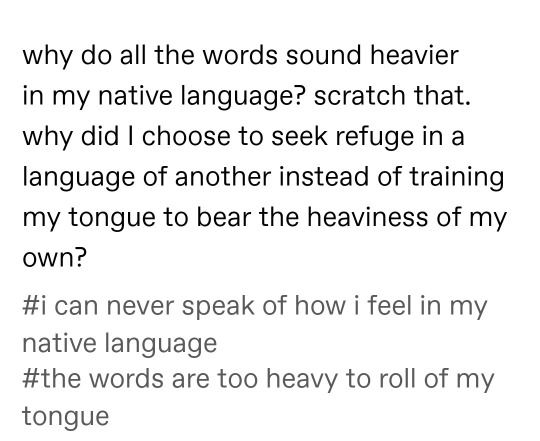
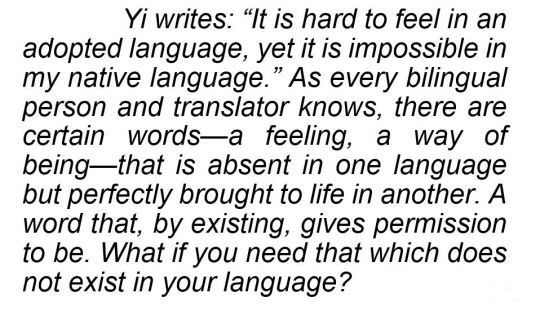
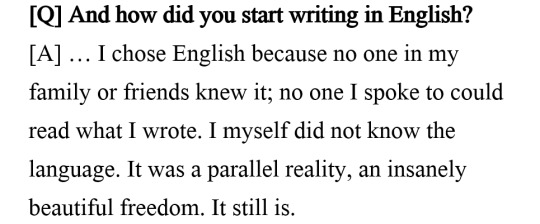
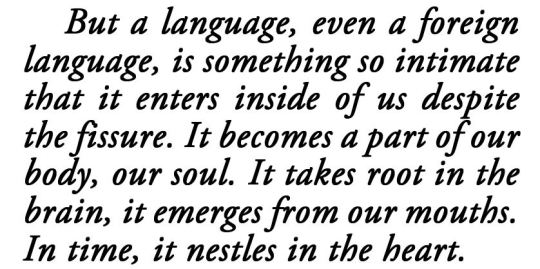
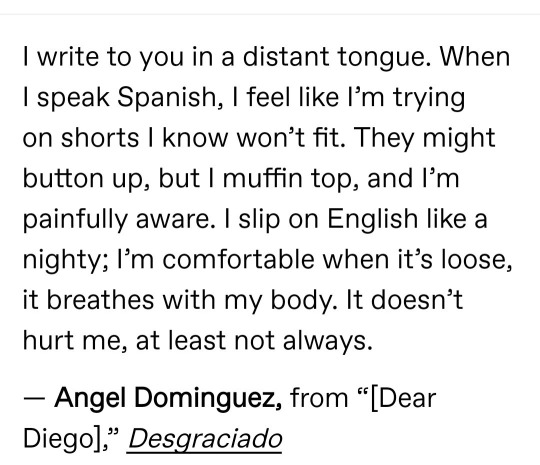
why do all the words sound heavier in my native language?
— @metamorphesque, Yoojin Grace Wuertz (Mother Tongue), Still Dancing: An Interview With Ilya Kaminsky (by Garth Greenwell), Jhumpa Lahiri (Translating Myself and Others), @lifeinpoetry
˗ˏˋ☕ˎˊ˗
#language#parallels#web weavings#i can never speak of how i feel in my native language#the words are too heavy to roll of my tongue#quotes#literature#ilya kaminsky#poetry#translated literature#jhumpa lahiri#dark academia
35K notes
·
View notes
Text
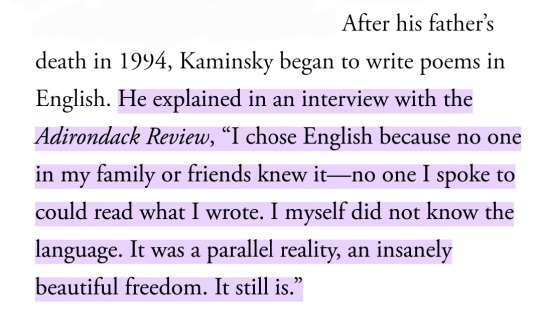

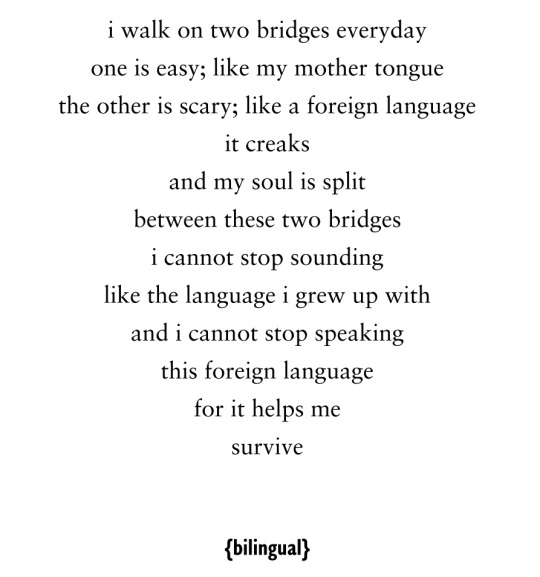

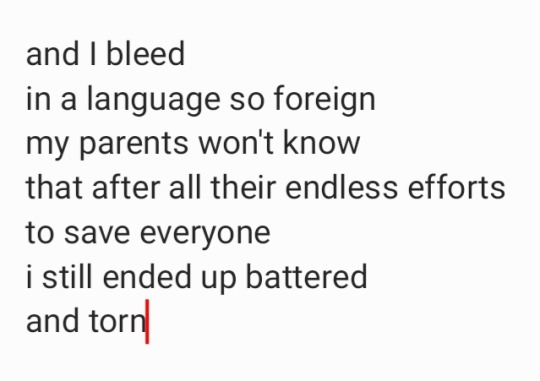

on finding escape through foreign languages
1. Ilya Kaminsky (Still Dancing: An Interview with Ilya Kaminsky by Garth Greenwell) // 2. Kamala Das (An Introduction) // 3. @noorunnahar ('bilingual' from yesterday i was the moon) // 4. Kim Namjoon "RM" (excerpt from Vlive 20220409) // 5. @averwonders (excerpt from my little notes diary 'Journal In Verse' // 6. @metamorphesque
#my first attempt at the thing i love the most: web weaving#with the emotion so close to me#i don't know it the theme matches to all of the texts but i tried#i love noor's yesterday i was the moon so much#web weavings#poetry#quotes#literature#dark academia#book quotes#words#mood#books#bts#noor unnahar#ilya kaminsky#kamala das#yesterday i was the moon#rm#rm bts#kim namjoon#on language#on mother tongue#seeking refuge in foreign languages#on writing#bilingual#multilingual#escapism#paralles#languages
164 notes
·
View notes
Photo

Ilya Kaminsky, “Still Dancing: An Interview with Ilya Kaminsky”
#quotes#interviews#ilya kaminsky#still dancing an interview with ilya kaminsky#portrait of the artist#at the end of the world we learn to dance#hope is the thing with feathers#m#x#all the world's a queue
51K notes
·
View notes
Text
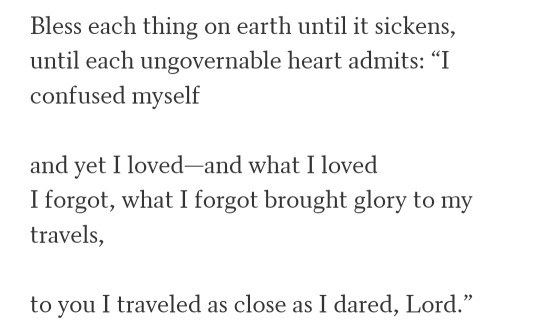
a toast, ilya kaminsky
#w#ilya kaminsky#i somehow didn't make the connection between him and that still dancing interview so i went and reread a bunch of poems#with open jewish eyes <3
11 notes
·
View notes
Quote
Is it foolish to speak of little joys that occur in the middle of tragedy? It is our humanity. Whatever we have left of it. We must not deny it to ourselves.
Ilya Kaminsky, from Still Dancing: An Interview With Ilya Kaminsky by Garth Greenwell
#w#interview#ilya kaminsky#don’t lose heart dear ones#the gentleness that comes not from the absence of violence but despite the abundance of it#a marvelous thing to be human
18K notes
·
View notes
Text

Still Dancing: An Interview with Ilya Kaminsky
470 notes
·
View notes
Text
Is it foolish to speak of little joys that occur in the middle of tragedy? It is our humanity. Whatever we have left of it. We must not deny it to ourselves.
— Ilya Kaminsky, from Still Dancing: An Interview With Ilya Kaminsky by Garth Greenwell
#ilya kaminsky#still dancing#little joys#dark academia#light academia#little things#literature#classic literature#english literature#books & libraries#dark aesthetic#lit#chaotic academia#romanticism#romantic academia
1K notes
·
View notes
Note
this may be a weird question but you joked that you own legolas in some tags, and as it happens i’m in love with lotr/the legendarium and also adore your blog. which is to say that i’d love to hear some of your thoughts on him, if you’re comfortable sharing?
ahh hi yes i think he’s such an interesting character!! there’s something so fascinating about the wood-elves for me, something so rooted in folklore and myth that compels my imagination. the dark wood inhabited by the deathless. more below cut:
as much as we know that boromir is tempted by the ring because his people are fighting a seemingly pointless battle just to hold back sauron’s forces at the expense of their own people—we can infer that the situation for legolas is exactly the same. the forces of dol guldur are held back by the wood-elves and no one else. thranduil has no ring of power to protect his people, has no other armies at his back, no aid from the other elven realms.
so, contrary the commentary/characterization of the films, i don’t think legolas would be confused at gandalf’s death just bc he’s “immortal and thus doesn’t understand the concept of death.” he’s the prince of the only elven kingdom without a ring of power for protection, the prince of a wood called taur-e-ndaedelos, the forest of great fear. he’s personally witnessed the transition of his home from greenwood the great to mirkwood. he personally witnessed the occupation of his home by the stronghold of the necromancer, dol guldur, and the darkness that followed. the descendants of ungoliant. the dark creatures and the death.
whenever i witness legolas’s consistently gentle characterization throughout lotr, i’m actually reminded of that ilya kaminsky quote:
“Is it foolish to speak of little joys that occur in the middle of tragedy? It is our humanity. Whatever we have left of it. We must not deny it to ourselves.”
[ from Still Dancing: An Interview With Ilya Kaminsky by Garth Greenwell ]
this is a consistent theme for tolkien through lotr.
“the world is indeed full of peril, and in it there are many dark places, but still there is much that is fair, and though in all lands love is now mingled with grief, it grows perhaps the greater.”
—the two towers, “lothlórien”
“there, peeping among the cloud-wrack above a dark tor high up in the mountains, sam saw a white star twinkle for awhile. the beauty of it smote his heart, as he looked up out of the forsaken land, and hope returned to him. for like a shaft, clear and cold, the thought pierced him that in the end the shadow was only a small and passing thing: there was light and high beauty for ever beyond its reach.”
—rotk, the land of shadow
Théoden's final words are to Merry on the battlefield on the Fields of Pelennor: "Live now in blessedness; and when you sit in peace with your pipe, think of me! For never now shall I sit with you in Meduseld, as I promised, or listen to your herb-lore." It is a heart-breaking moment, and for a while Merry believes he can never again enjoy his pipe because it will remind him of losing his friend, but Aragorn convinces him otherwise: "Smoke, then, and think of him!" said Aragorn. "For he was a gentle heart and a great king and kept his oaths; and he rose out of the shadows to a last fair morning. Though your service to him was brief, it should be a memory glad and honourable to the end of your days." (x)
bc legolas does seem to exemplify that throughout the lotr books. he is chosen not for great deeds (glorfindel would be the obvious choice there) but more it seems bc of the lightness of demeanor he has maintained despite despite despite. not to say that he is not capable of great deeds! we know he is a formidable archer (he slew one of the fell beasts of the nazgûl in the dark) and skilled at hand-to-hand combat with his silver-hafted knife (a weapon and skill set necessary in a dense, dark wood with no room to draw or maneuver swords like andúril/glamdring). and this is not to say that deadliness in combat is the only mark of great deeds! tolkien makes it so very clear that great deeds are not defined by glory or battle but by strength of heart. <3
i love that moment in fotr when legolas teases gandalf and the fellowship, says that he goes to find the sun, the innocence with which he reacts to the ents and the huorns in two towers, the way he is always singing, the way he learns to not only accept gimli but grows to love him so much that he brings gimli to the undying lands. this is the son of a sindarin king who likely witnessed the sacking of doriath. it would certainly explain why thranduil is characterized as having not only a mistrust but dislike of dwarves in the hobbit.
meanwhile, we know absolutely nothing of legolas’s mother! tolkien says that oropher adopted the customs of the silvan elves when he was made their king. it’s possible that thranduil married a silvan elf. it would make sense from a political standpoint. legolas refers to himself as a wood-elf, which could lend itself to that theory. either way, interesting!
now tolkien’s description of the wood-elves:
The feasting people were Wood-elves, of course. These are not wicked folk. If they have a fault it is distrust of strangers. Though their magic was strong, even in those days they were wary. They differed from the High Elves of the West, and were more dangerous and less wise.
we’re told that elven magic is not like wizard magic but rather more earthy, more natural, a part of the fabric of their beings, of the realms they inhabit. i could speculate on what i think the magic of the wood-elves is, but idk i think tolkien had it right in keeping it enigmatic. the idea of an elvenking hidden deep in the dark woods is the stuff of myth, of songs. an elf-king with the power to transport you before him, an elf-king with the power to either alter your perception of reality or to truly transport his own people to safety at the hint of a threat, to extinguish light, with the ability to singlehandedly and without a ring of power keep the forces of dol guldur at bay.
it’s impossible for me to think about legolas and not think about his father and his grandfather, to not think about the life he must have lived leading up to the forming of the fellowship.
Seven mounds upon the left, and nine upon the right," said Aragorn. "Many long lives of men it is since the golden hall was built."
"Five hundred times have the red leaves fallen in Mirkwood in my home since then," said Legolas, "and but a little while does that seem to us."
— the two towers, "the white rider"
legolas, the prince of a hidden, fighting, wary people. a people who must take any chance they can to celebrate and find joy in still being alive, in still being together. a people with no magic outside of their own to protect them, a people who coexist with death, who inhabit an oppressive darkness forced upon them.
and still we see that legolas is not worn down by the years of darkness, that he is characterized not by bitterness or despair but by a kind of gentle resilience and strength of heart, motivated by loyalty and love of his friends. he is the son of the elvenking. he owes no allegiance to aragorn, a mortal king; nothing to gimli, or to the hobbits. but he sees minas tirith and he talks about how he will help aragorn to rebuild, to bring birdsong and green, growing things. he marches to the doorstep of mordor for the love of his friends and middle-earth. he lingers in middle-earth even after he is struck by sea-longing. and when he finally leaves middle-earth, it is only after the penultimate member of the fellowship has passed away and just he and gimli remain. and then he takes gimli with him when he sails to the undying lands. how could i not love a character with that kind of deep loyalty, deep love, deep feeling?
#ask#anon#i mean. to be fair. that kind of deep love and loyalty is what characterizes each member of the fellowship but! legolas has that added#✨wood-elvishness✨#that i am fascinated by#lotr#i also just feel like he is personified by that richard siken quote:#and the gentleness that comes not from the absence of violence but despite the abundance of it#tolkien blogging
251 notes
·
View notes
Photo
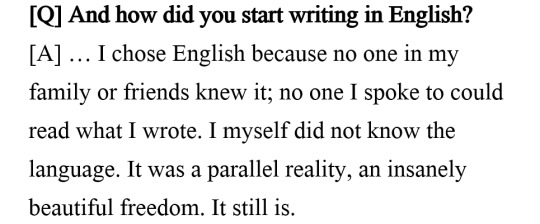
Still Dancing: An Interview With Ilya Kaminsky
by Garth Greenwell
#ilya kaminsky#writing in a language that's not your own grants you a sense of freedom you didn't know you could be given#quotes#literature#deaf republic#poetry#dark academia#dark academia aesthetics#chaotic academia#chaotic academia aesthetics#romantic academia#light academia#academia#interview
12K notes
·
View notes
Text

Ilya Kaminsky on the question of poetry as political witness and resistance from "Still Dancing: An Interview With Ilya Kaminsky (Garth Greenwell, Poets & Writers March/April 2019)
#ilya kaminsky#ars poetica#quote#literature#poem#art#politics#kaminsky#poets & writers#resistance#text#words#*#God i adore this man#annotations
4K notes
·
View notes
Text
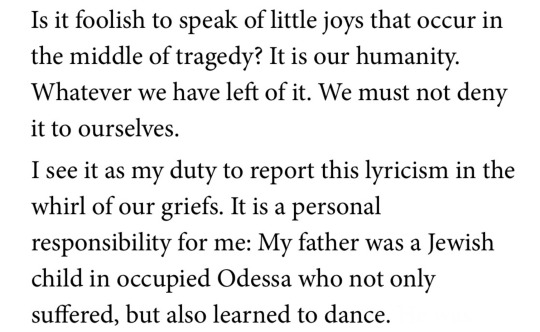

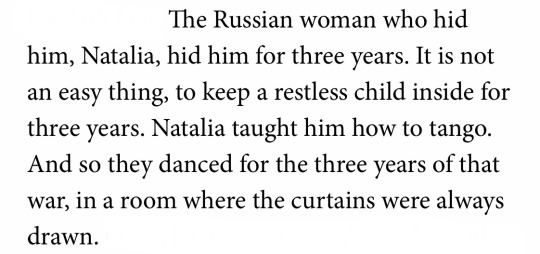

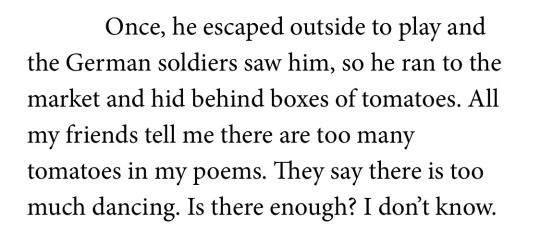
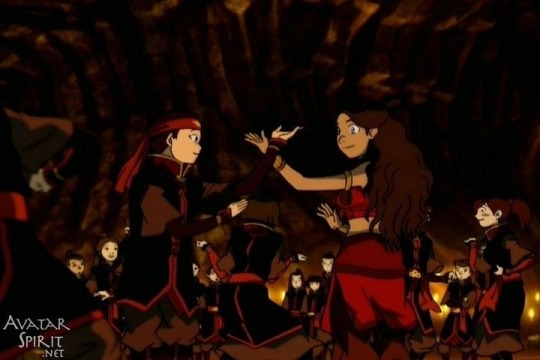

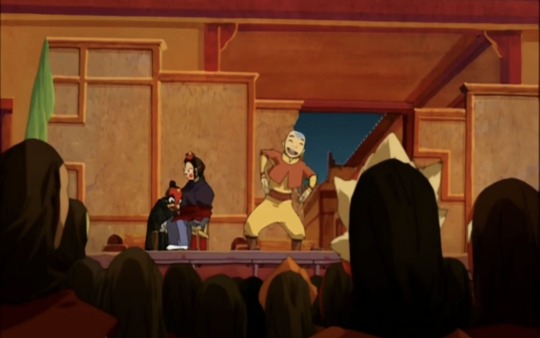
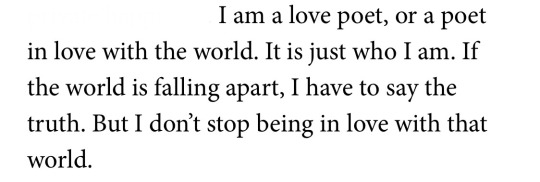
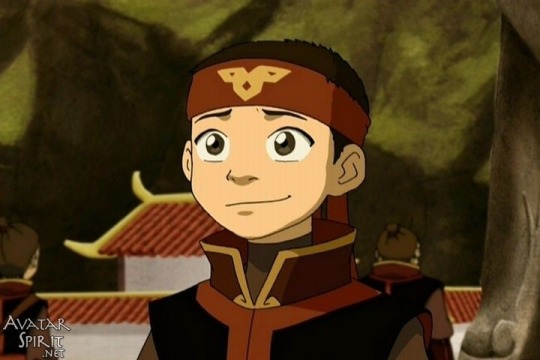
aang + dancing
still dancing: an interview with ilya kaminsky // avatar: the last airbender
#this interview always makes me think of the cave scene and also makes me cry#i love him#btw i wanna clarify that this is not a ship post#u can tag it as such if u want for ur own personal blog navigation but that’s not my original intent#atla#avatar: the last airbender#aang appreciation#aanglove#op#scheduled
226 notes
·
View notes
Photo

#FromTheArchive: Ilya Kaminsky in “Still Dancing: An Interview" by Garth Green Greenwell.
#FromTheArchive#ilya kaminsky#deaf republic#garth greenwell#history#poets#Poets & Writers#writer's advice#Writer's Life#On writing
267 notes
·
View notes
Photo
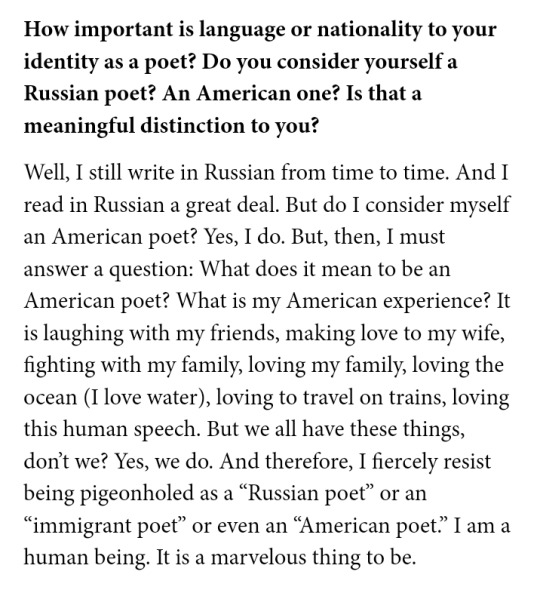
Ilya Kaminsky, “Still Dancing: An Interview with Ilya Kaminsky”
1K notes
·
View notes
Text
"Here is another image from the early 1990s, from a different war: Transnistria, just sixty-five miles from our apartment in Odessa. I am fifteen years old. People knock on our door saying they fled without a change of underwear, asking to please let them make a phone call. In this chaos people lose their pensions, their homes, but they still go to the city garden in Odessa and dance while old men squeeze their accordions. Old women polka across the street, their medals clinking, beer bottles raised in the air as the rest of us clap from the benches. Time squeezes us like two pleats of an accordion."
— Ilya Kaminsky, from Still Dancing: An Interview With Ilya Kaminsky by Garth Greenwell
I was reading this interview and this part jumped out for me. It's the same war my mother, my grandmother and my aunts told stories of, because they were there. I was born 3 years after that war ended, in Dubăsari, on Transnistrian territory. My mother told stories of how she was at school when they bombed the place, she can never see fireworks without being transported back to that day. My grandmother told stories of how they hid under the table and slept there at night just in case a bomb dropped. I grew up as a citizen of Moldova on Transnistrian territory, passing borders back and forth guarded by armed soldiers. And each time we waited at the border to exit Transnistria, we sat there afraid they wouldn't let us pass. My mother, aunts and everyone on the bus prayed each time we were about to reach the border. At the entrance to my grandmother's village, there used to be a school where girls learned sewing. The place is now in ruins riddled with bullet holes. I've seen abandoned tanks as a small child and places shattered. I have not lived through war, but my family has. A war the world has never even heard of. In a country even Europeans don't know exists until they see it on an Eurovision board once a year and then forget all about.
The world, Europe.. never cared about its countries under Russian occupation and/or influence. Sometimes.. I'd like to tell people here that if their country has never been threatened with war by Russia, then they should sit down and stop debating war strategy and whether Russia was justified in attacking Ukraine or not. The world never cared about eastern Europe, but they are watching now. And they should be watching. For once, they should be watching.
5 notes
·
View notes
Quote
What's important for a poet speaking another language are those little thefts between languages, those strange angles of looking at another literature, "slant" moments in speech, oddities and their music.
Ilya Kaminsky, from “Still Dancing: An Interview With Ilya Kaminsky” by Garth Greenwell (Poets & Writers, March/April 2019)
109 notes
·
View notes